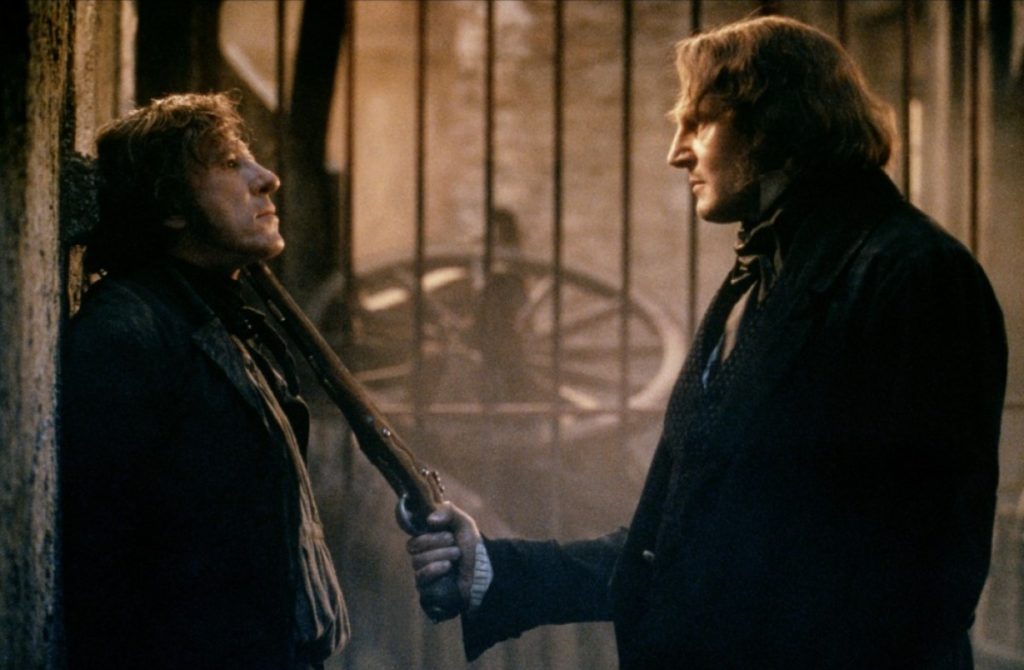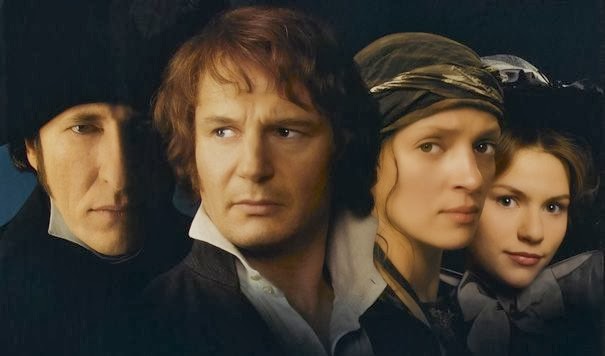Les Misérables (1998)
CAST: Liam Neeson, Geoffrey Rush, Uma Thurman, Claire Danes, Hans Matheson, Peter Vaughan
REVIEW:
Those wanting the musical numbers of the popular stage musical adaptation of Victor Hugo’s 1862 novel Les Misérables—a mainstay onstage since its debut in 1985—may be disappointed, but among non-musical film adaptations, Bille August’s interpretation of the oft-told tale is a handsome adaptation, picturesquely-filmed, well-cast (at least in the two lead roles), and finding an effective balance of condensing Hugo’s sprawling epic into a coherent abridged film version that—while some of its omissions will not sit well with purists—retains the novel’s key themes and heart. The result is not only one of the better examples of the assorted Les Mis adaptations, but a handsomely-crafted period drama in itself accessible to Hugo neophytes.
The story will be familiar to many, but here’s the basics. In the unforgiving social climate of 1800s France, convict Jean Valjean (Liam Neeson) is paroled from nineteen years of hard labor but finds every door closed and faces no prospects except starving on the streets until a chance encounter with a kind Bishop (Peter Vaughan) leads the embittered man to reassess his life and become someone new (which, unfortunately for him, involves breaking parole and disappearing). Years later, Valjean has reinvented himself under false papers as the kindly, respected mayor and chief industry leader of a small French town, but his life in peace is thrown into jeopardy by the arrival of the stern new police inspector, the pitiless Javert (Geoffrey Rush, looking like his face might crack if he smiles), who knew Valjean in his prison guard days. While Valjean instantly recognizes Javert, the inspector takes a bit to catch up, giving Valjean the chance to prepare an escape. Along the way, he falls into making a promise to protect Cosette (Mimi Newman), the young daughter of sickly prostitute Fantine (Uma Thurman), that will dominate his life. After narrowly giving the dogged Javert the slip in Paris, Valjean and Cosette (played as an adult by Claire Danes) live in peace for ten years, but Valjean’s life is again complicated when the sheltered Cosette embarks on a star-crossed romance with fiery young would-be revolutionary Marius (Hans Matheson). Paris is a powder keg ready to blow, and on the night that Marius and company take to the barricades, Jean and Javert’s paths will cross again.
While faithful to the broad strokes of Hugo’s novel, Les Mis is an abridged version. To an extent, this might be unavoidable—not even a 135-minute movie can include all aspects of Hugo’s notoriously dense and sprawling 1,000+ page magnum opus, nor for that matter can even the popular three-plus hour musical stage version—but some of its omissions will wrankle some fans. The character of Eponine is entirely cut, and the Thenardiers only appear in a single scene (their intro in the book and musical, when Valjean haggles Cosette out of their money-grubbing clutches). Marius’s storyline is shallowly developed and his revolutionary activities covered in truncated fashion, mostly reducing him to “Cosette’s love interest”. Characters like Gavroche (Shane Hervey) and Enjolras (Lennie James) are reduced to barely-there background window dressing. The movie skims through the barricades sequence in perfunctory fashion, and it is plainly not where the filmmakers’ interest level lies. That’s with Valjean versus Javert, though in their defense, that’s also by far the most compelling aspect of this version. This is a bit of a double-edged sword; the rather bland Cosette/Marius love story is not among the movie’s more stirring sections (at least this movie makes an attempt to give it slightly more development than the musical, but it’s not entirely effectual), and we get a little impatient wanting to get back to central focus on Valjean and Javert. The movie also makes a couple small inventions, including expanding Valjean and Fantine’s relationship into a semi-romance, and capping things off with a more conventionally “happy ending”. Nonetheless, while Rafael Yglesias’ screenplay makes various significant cuts and other deviations, it succeeds in two key areas: conveying the novel’s core themes of compassion and redemption, and developing the characters—at least the two principals Valjean and Javert—into more than one-dimensional Cliff Notes archetypes. Hugo’s novel, like his other seminal work The Hunchback of Notre Dame, was an impassioned outcry against social injustice that turned expectations on their heads when it came to who Hugo depicted as the “good guys” and “bad guys”. In The Hunchback, fringe elements of society like the titular hunchback Quasimodo and the gypsy Esmeralda were the heroes, while the Archbishop Claude Frollo was the villain. Here, characters like a convict and a prostitute are portrayed more sympathetically than the police inspector, the personification of “law and order”. This was almost certainly more daring and controversial in 1862 than in 1998, but it hasn’t lost its social commentary. Valjean might be the criminal, and Javert the law enforcer, but (at least after the opening scenes) Valjean lives a life of compassion and generosity, while Javert’s single-minded fixation with following the letter of the law blinds him to empathy or any moral nuance. Who is following the law, and who is the hero of the story, are not one and the same.
 Liam Neeson adds Jean Valjean to a string of strong, larger-than-life performances alongside Oskar Schindler, Robert Roy McGregor, and Michael Collins, believable as both the haggard, embittered, almost feral convict we are introduced to, and the debonair, respectable gentleman Valjean reinvents himself as. Neeson towers over the film, both physically and in terms of screen presence, giving a grand, impassioned rendition of Jean Valjean that, while the “hero” of the story, is a flawed and imperfect figure. Geoffrey Rush is a solid foil, using his hangdog expression to good effect playing the humorless, unyielding Javert with a stoicism that covers a zealous obsession with “The Law”. Javert is a fanatic, too unshakably convinced of his own rectitude to see that his absolutist devotion to his black-and-white ideals of law and order make him more villainous than the criminal he’s pursuing. Rush manages two tricky tasks; conveying feverish obsession behind a stoic demeanor that never cracks, and making Javert hissable without giving in to the temptation for mustache-twirling or scenery-chewing. Javert might be considered the villain, but he’s not really “evil”, and there are times when we pity him more than dislike him. Neeson and Rush are a splendidly-cast pair who make their portrayals of iconic and oft-played literary characters like Valjean and Javert stirring and compelling, and the scenes between them crackle with intensity and tension.
Liam Neeson adds Jean Valjean to a string of strong, larger-than-life performances alongside Oskar Schindler, Robert Roy McGregor, and Michael Collins, believable as both the haggard, embittered, almost feral convict we are introduced to, and the debonair, respectable gentleman Valjean reinvents himself as. Neeson towers over the film, both physically and in terms of screen presence, giving a grand, impassioned rendition of Jean Valjean that, while the “hero” of the story, is a flawed and imperfect figure. Geoffrey Rush is a solid foil, using his hangdog expression to good effect playing the humorless, unyielding Javert with a stoicism that covers a zealous obsession with “The Law”. Javert is a fanatic, too unshakably convinced of his own rectitude to see that his absolutist devotion to his black-and-white ideals of law and order make him more villainous than the criminal he’s pursuing. Rush manages two tricky tasks; conveying feverish obsession behind a stoic demeanor that never cracks, and making Javert hissable without giving in to the temptation for mustache-twirling or scenery-chewing. Javert might be considered the villain, but he’s not really “evil”, and there are times when we pity him more than dislike him. Neeson and Rush are a splendidly-cast pair who make their portrayals of iconic and oft-played literary characters like Valjean and Javert stirring and compelling, and the scenes between them crackle with intensity and tension.
Neeson and Rush own the movie, with no one else making nearly as much impression. Uma Thurman is surprisingly good as Fantine, but her screentime is limited to the first act. Mimi Newman is delightful as the child Cosette, but Claire Danes comes across as a bit of a lightweight and is prone to being overwrought in her most emotional moments. Hans Matheson is bland, but he’s saddled with an underdeveloped abridged version of Marius that relegates him mostly to the thankless role of “the love interest” (on both page and stage, Marius is a main character in his own right, arguably more so than Cosette). Apart from Thurman, the biggest impression in the supporting cast comes from the one with the least screentime, veteran actor Peter Vaughan, who only appears for five minutes or so almost at the beginning of the movie, but makes the Bishop a strong enough presence that we buy that the life lesson he imparts to Valjean hangs over him for the rest of his life.
Bille August (a onetime protege of Ingmar Bergman) does an efficient job whittling Les Mis into 135-minutes that moves at a brisk pace but (perhaps apart from whisking perfunctorily through the barricade sequence) seldom feels rushed and not only remains entirely narratively coherent but retains the novel’s key themes, if not all of the specifics. Jorgen Persson films handsomely (the movie was filmed on location in Paris, as well as in the Czech Republic), and Basil Poledouris’ sweeping score accentuates the film’s dramatic and emotional heft. For the straightforward basics of Hugo’s seminal epic, it’s a finely-crafted and moving period drama that delivers over two hours of solid, stately entertainment.
* * * 1/2
